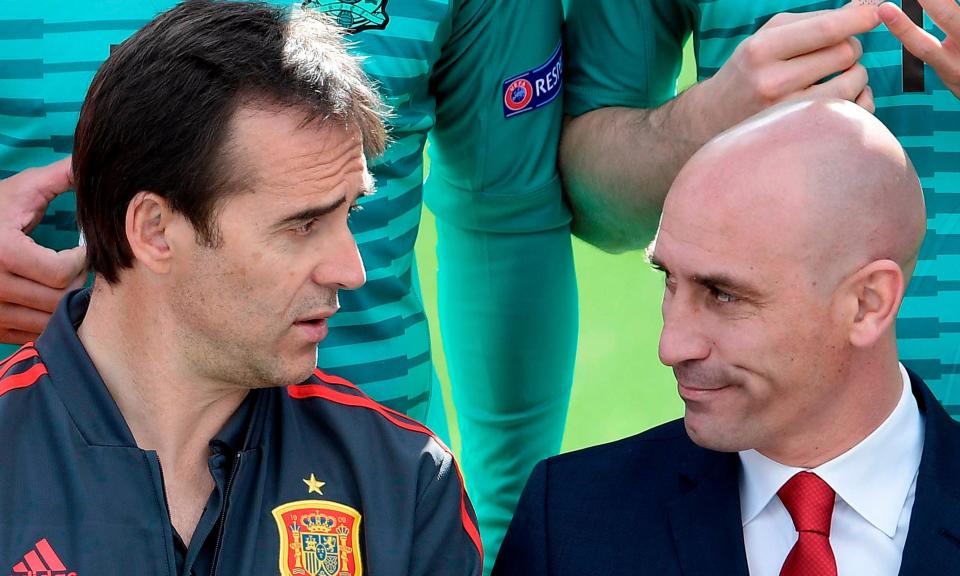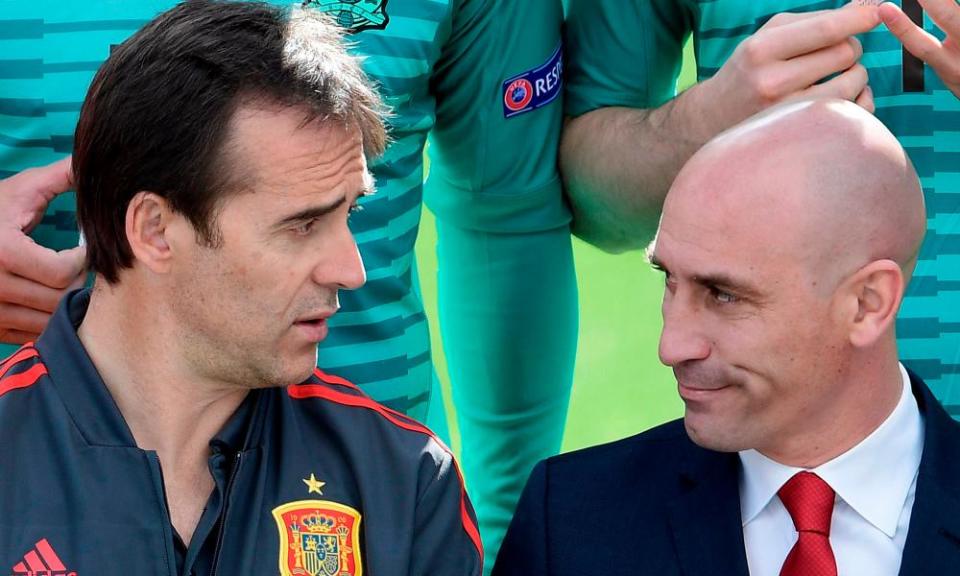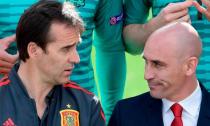Anger and ethics at heart of Spain’s decision to sack Julen Lopetegui
Luis Rubiales took a call and listened in shock to what he was told. He asked for more time, was turned down, so he hung up and hurriedly dialled Julen Lopetegui’s number. There was no answer and very soon it was too late.
At 5.45pm Russia time on Tuesday, five minutes after the president of the Spanish Football Federation had been informed, everyone else knew too. Unforgivable, the president thought. Lopetegui, the Spain manager, had gone to see his players, to tell them what Real Madrid had just told Rubiales: that he was joining the club after the World Cup. At the same time, a statement went up on Real’s website.
The fallout was nuclear. Taken by surprise, it took over an hour for the federation to respond with a short statement of its own. Rubiales was in Moscow at the Fifa congress but he left swiftly for the airport where he boarded the next available flight to Krasnodar, 1,196km to the south where Spain have their base. He was furious as he considered what to do.
It was two days before the start of the World Cup. It was also only three weeks since Lopetegui had renewed his contract until 2020. “This is our project,” Rubiales had said then. Now that project had been broken the question was whether Spain’s effort to win the World Cup had been broken too, irreversibly damaged before it began.
Would Lopetegui’s move to the Bernabéu prove an unwelcome distraction? Spain v Portugal would, at least in the press room, be something else. They could, and would, demand that questions be all about the game, but few would listen. Not long ago, Lucas Vázquez had been asked about Real’s search for a manager and the departure of Zinedine Zidane. After he gave an answer, the federation press officer reminded everyone they were there to talk about Spain. Lopetegui, sitting alongside, noted, “Bloody hell, it’s the World Cup,” like there could not be anything bigger. When those words are played back now they sound rather different, hollow.
No one was seriously suggesting Lopetegui’s commitment to winning the tournament was reduced but that contradiction between words and deeds did not go unnoticed. And did his demand for focus become harder to digest now? How easy would it be to keep the focus – of the public, the players, the press – on the pitch? In practical terms, would he have to deal with signings for Real? Would he dedicate some of his time to planning for his club as well as his country? Would they be calling him? Would that matter? He would not be the first manager to coach a national team knowing his post-tournament destination but suggestions this is like Luis Aragonés heading to Fenerbahce in 2008 or Louis van Gaal going to Manchester United in 2014 are a false equivalency.
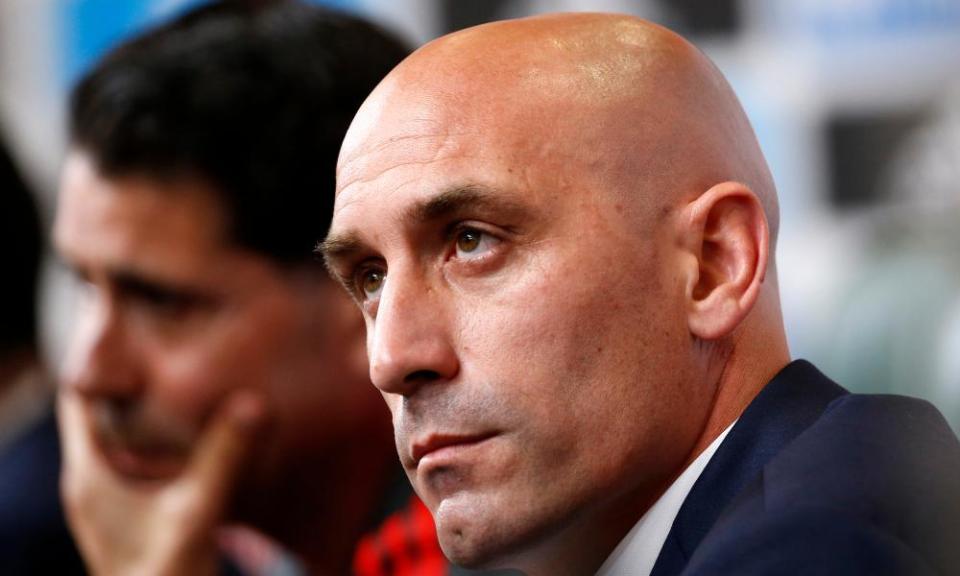
Equally, no one was seriously suggesting Spain’s players would have any less desire to win the World Cup because their manager was heading to Real Madrid – the idea Andrés Iniesta and his Barcelona club-mates might effectively down tools is of course absurd, or that decisions would be made to favour Real players now, but the relationship would be conditioned by the new scenario. Any doubt may be debilitating, however unfounded, and authority undermined. There is a phrase the Spanish are fond of: Caesar’s wife must not only be honest, she must appear honest.
Did that really matter? Did any of it? Could they go on as if it had not happened? Rubiales ruminated on all this but there was something else: anger. Or to use his word, “valores”. Ethics. He barely slept. Instead, he spoke. He spoke to staff. He spoke to Lopetegui. He spoke to the players. Some told him to stick with Lopetegui but he could not escape that feeling and it ate at him.
“I do not feel betrayed,” Rubiales said on Wednesday, but he looked and sounded like a man who felt betrayed; like a jilted lover, he responded in kind. It was not just what had been done but the way that it had been done – just how hurtful it had been. The way it had been blown apart; this was a hell of a way to start the World Cup and Spain had once again come to consider themselves candidates, remember. Two words, two numbers, repeated often, hit hard during his press conference: two and five. He had been told two days before the World Cup and five minutes before the whole world had been told. He had been given no chance of salvaging this. So he acted – Lopetegui was sacked, just weeks before he would have walked.
For some, Rubiales had hacked at his nose: see how you like that, face! This was about hurt pride and in taking an emotional decision the crisis had deepened. For Rubiales, the situation was already “extremely difficult”, “sad”, “complicated”, “unworkable”. Spain’s chances of winning the World Cup look dramatically diminished – and so does the federation. But perhaps that was already true and while they have lost much, including perhaps the tactical nuance and variations Lopetegui has introduced, this is a group of players who can still compete and have a certain capacity for self-management.
Continuity is the idea, even without the manager, but this is not a good solution for anyone. There probably was no good solution for anyone – still less for Lopetegui. Few have thought about the impact this has on him. He has lost the chance to compete for the World Cup. How must he feel about Real now? However much of a draw the Bernabéu is, the cost has been huge. Some lingering bitterness is inevitable and not just towards Rubiales. The move to Madrid cannot feel the same now.
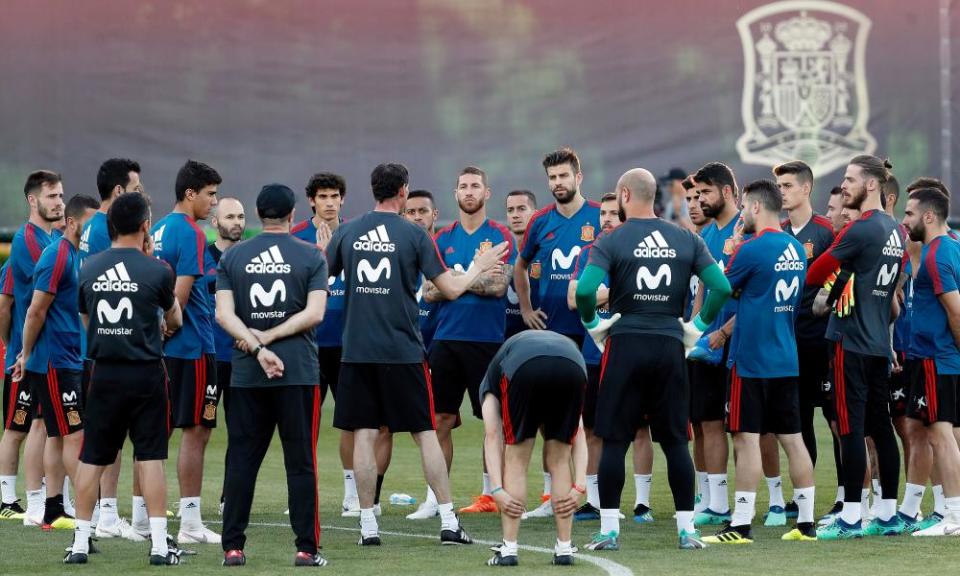
And all because of the way it was done. One of the saddest things is it was so avoidable, so unnecessary. “Had it been down to Julen, things would have been done differently,” Rubiales said, but that did not save him. Because he, a new president, confronted with what some have deemed the worst crisis in Spanish football history, was furious. And because, he insisted, this was said, about ethics, “values”. That message was all the more significant after almost three decades under the former president ended with Angel María Villar in jail. “We couldn’t ignore this,” Rubiales said. “We can’t find out about this five minutes before a press release.”
The first time he noted it was only two days before the World Cup, he slowed and nodded, stressing the mess they had been left in. “Two days.” He talked about this as a message to all the federation employees: “There are ways of behaving.” He had to take a stand on a point of principle, he claimed. “We might look weak now but we’ll be stronger for it in the long run,” he added, although it felt personal as much as institutional.
“If we are here it is because of Julen,” Rubiales said. Now they are here without him. Spain did not have a manager, 48 hours from the start of their tournament. Fernando Hierro, the national team’s sporting director, was named as his replacement: in 2016-17 he missed out in the second division play-offs with Real Oviedo
READ MORE: Portugal v Spain: Silva still wary despite Lopetegui departure
READ MORE: Sadio Mane insists he is happy at Liverpool amid Real Madrid speculation
READ MORE: Chelsea face difficult decision over Antonio Conte future
In a radio interview he had said he had no intention of ever being the Spain manager. One and a half days later, that is exactly what he is. “We want to change as little as possible,” Rubiales said, hence the decision, but everything had already changed from the moment the phone rang.

 Yahoo Sport
Yahoo Sport 





































